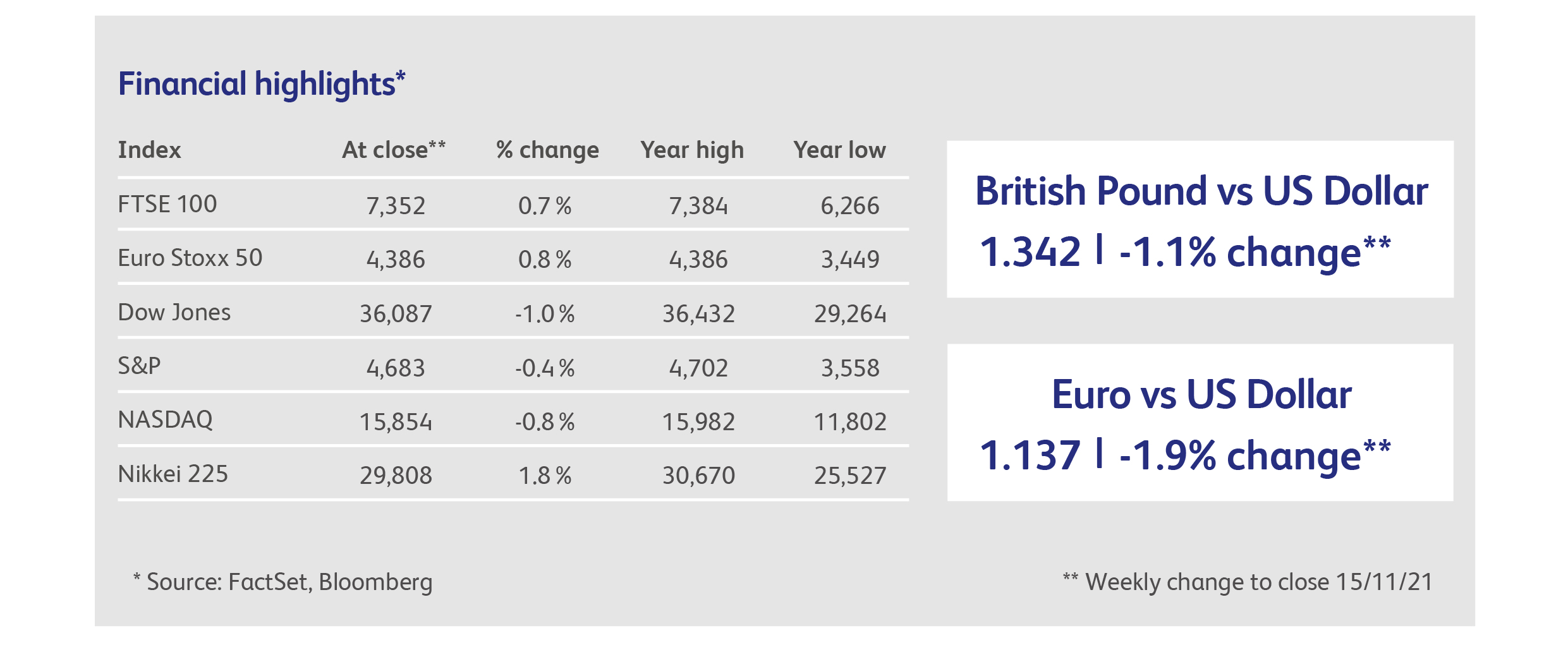
16 November 2021
Bond markets remained in a feverish state last week, after inflation data again suggested that central bankers are wrong about the risk of rising inflation. US inflation rose to 6.2% in October, its highest level in 30 years. One has to go back to the inflationary era of the 1970s and early 1980s to find a period when inflation was consistently above its current levels. With the prices of cars, rent, furnishings, hospital services and recreation all rampant, it is likely to be at least several months before US inflation recedes. And that forecast relies on a resolution of the many issues dogging supply chains. All these factors increase the risk that consumers begin to anticipate higher inflation, bringing purchases forwards and demanding higher wages to compensate. Few economic forecasters have this as their most likely scenario yet, but several are highlighting the risk.
The likelihood of wage pressures is dependent on the supply of labour, which has been dented by the pandemic as older workers, formerly-working parents and migrants have dropped out of the workforce. The expectation is that these trends will, at least, partially reverse, and that this will reduce some of the pressure on wages. However, that can’t come too soon for inflation, as some measures of labour shortages in America are currently at all-time highs. About half of small-business owners in the US are struggling to fill vacant positions and, for every unemployed American, there are 1.4 job vacancies. Moreover, data last week showed that an unprecedented 4.4 million Americans quit their jobs in September. No industry was immune: the numbers increased both in the state and the private sector, and reached records in leisure and hospitality, manufacturing and healthcare.
Bond markets are usually quite good economic forecasters and they are in no doubt that, short-term, interest rates are going up despite the exhortations of central bankers. US 2-year government bond yields spiked from 0.2% to 0.5% in the last month, having spent the past eighteen months in a state of relative apathy. At longer maturities, however, the analysis becomes a question of whether these actions will be good or bad for growth. After all, with governments and corporations so heavily indebted, rate rises can be expected to have a significant impact. The question then is whether the current relatively rapid economic growth will be sustained into the longer-term. Longer-maturity bond yields have been pessimistic, on balance: they have been rising, but are still a long way short of the levels associated with a return to “normal” economic growth. If only investors could disentangle the effect of the $300 billion a month still being spent by central bankers in government bond markets…
It’s not just waves of government cash that are hitting markets – a feature of the post-pandemic world has been the huge increase in the wealth of consumers and in the savings of investors. These effects have been concentrated in the US where, despite the recession, the tens of millions of job losses and lockdown restrictions, households’ disposable income actually increased. Now this money is hitting the markets for manufactured goods as well as for financial assets and, for the first time in living memory, we are in a world where there is too much demand for everything and not enough supply. With the monetary policy needle still set to “maximum growth”, bond markets are rightly reflecting uncertainty around the extent, duration and consequences of inflation.

Marks & Spencer Group shares enjoyed a moment of success in its decades-long turnaround, rallying over 20% after the company raised its profit forecast for the second time this year. Management now expects profits to reach £500m for the current fiscal year, versus a recent previous estimate of £350 million. Improvements were reported across the food, clothing and online sales businesses.
Start-up electric vehicle maker Rivian soared by nearly 70% in its first few days of trading, following its initial public offering last week, taking its market value to over four times its private market valuation of less than a year ago, and above the valuations of Ford and General Motors (which are themselves at the highs of the past two decades). Rivian raised about $12 billion, making it the largest capital raising for an IPO since Facebook in 2012. The company’s founder referred to supply-chain issues facing the automobile industry as being mainly labour-related and said that, in some cases, Rivian’s own staff are being seconded to suppliers to assist with production.
The age of the conglomerate is officially over, and the age of the break-up has begun. Or so it would seem from announcements this week by General Electric Co (GE), Johnson & Johnson and Toshiba Corp to split up their businesses. GE will break into three separate companies, one making jet engines, one making power systems and turbines, plus a third healthcare division. Johnson & Johnson will break itself up into two public companies, one focused on drugs and medical devices, and the other on consumer products, and Toshiba will spin off its energy and infrastructure unit, as well as its device and storage operations.
Chinese internet giant Tencent reported a 13% increase in revenues for the third calendar quarter, the slowest rate of growth since the company went public in 2004. Growth was constrained by a series of new government regulations, most notably impacting Tencent’s advertising and gaming revenues. As the first of China’s big internet firms to report, the results bode badly for the rest of the Chinese technology sector.
Highlights
Calendar
This publication is intended to be Walker Crips Investment Management’s own commentary on markets. It is not investment research and should not be construed as an offer or solicitation to buy, sell or trade in any of the investments, sectors or asset classes mentioned. The value of any investment and the income arising from it is not guaranteed and can fall as well as rise, so that you may not get back the amount you originally invested. Past performance is not a reliable indicator of future results. Movements in exchange rates can have an adverse effect on the value, price or income of any non-sterling denominated investment. Nothing in this document constitutes advice to undertake a transaction, and if you require professional advice you should contact your financial adviser or your usual contact at Walker Crips. Walker Crips Investment Management Limited is authorised and regulated by the Financial Conduct Authority and is a member of the London Stock Exchange. Registered office: Old Change House, 128 Queen Victoria Street, London, EC4V 4BJ. Registered in England and Wales number 4774117.
Important Note
No news or research content is a recommendation to deal. It is important to remember that the value of investments and the income from them can go down as well as up, so you could get back less than you invest. If you have any doubts about the suitability of any investment for your circumstances, you should contact your financial advisor.